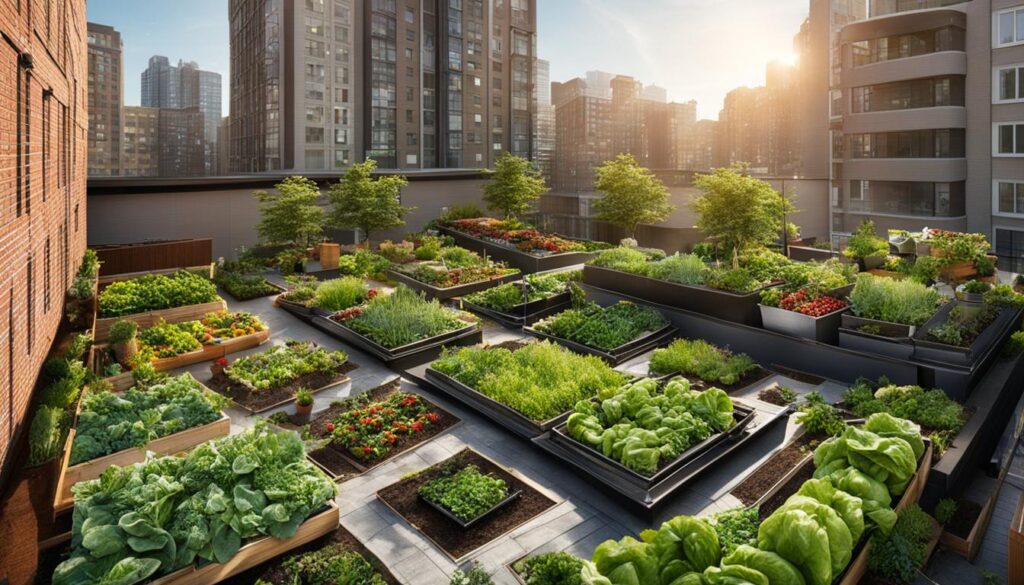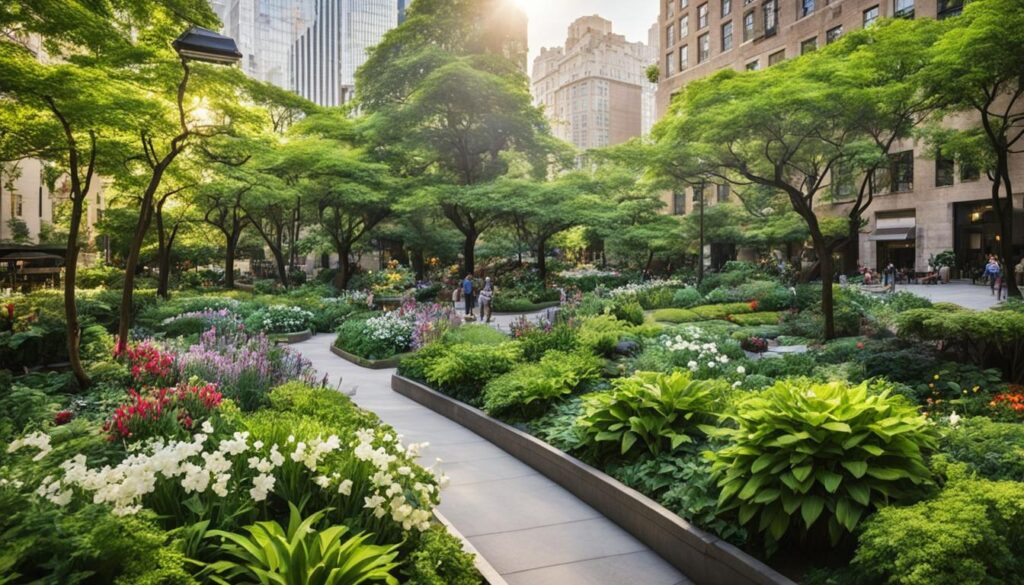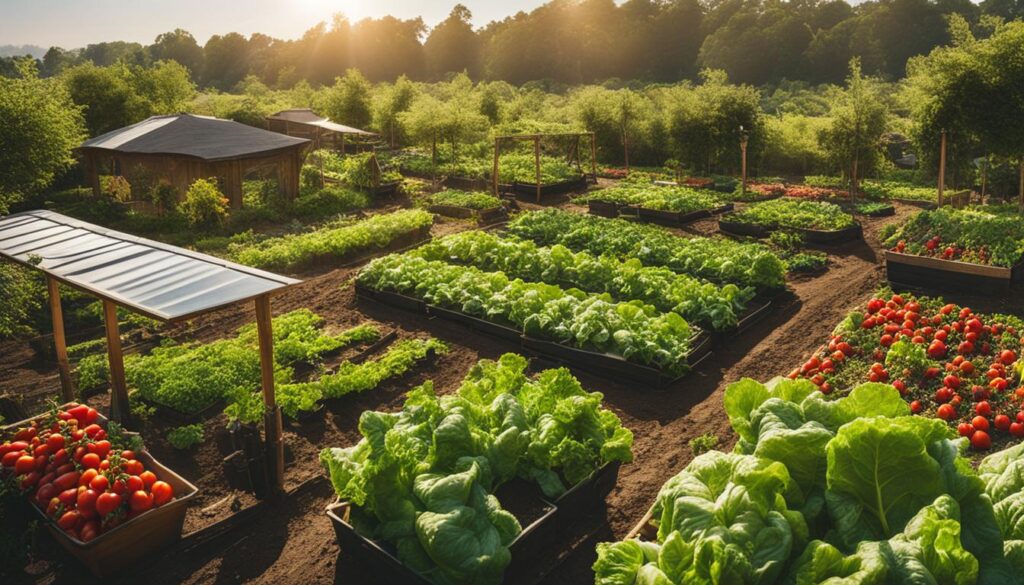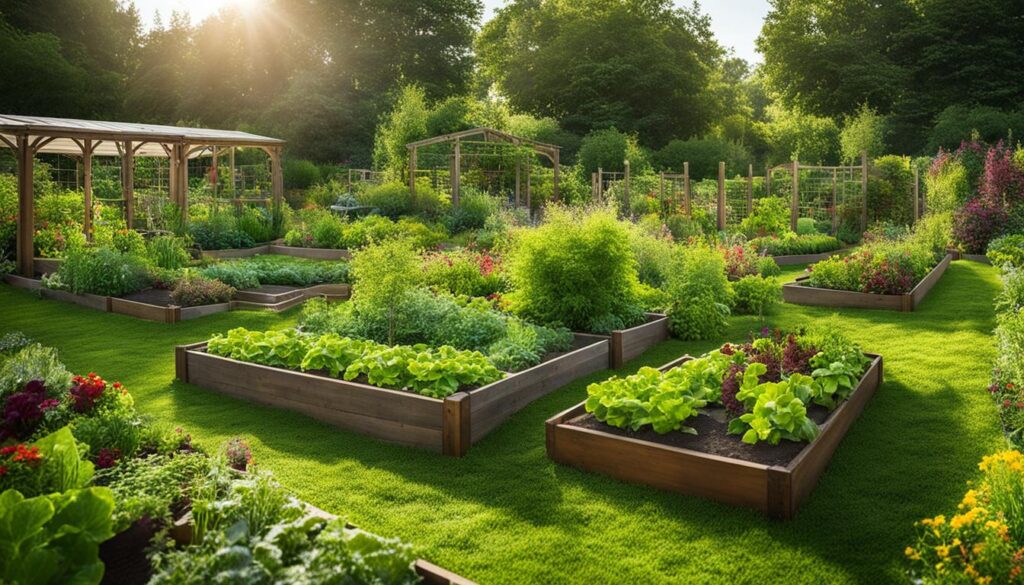Welcome to our article on community gardens in Victoria! If you are looking for ways to embrace sustainable living, urban gardening, organic gardening, and eco-friendly lifestyle, you’ve come to the right place. Community gardens in Victoria offer a fantastic opportunity to grow your own food, connect with nature, and adopt a more sustainable lifestyle.
Victoria’s thriving local food movement and sustainable communities are intimately connected to its community gardens. These gardens provide green spaces in urban areas and promote urban farming, biodiversity conservation, and social well-being.
Key Takeaways
- Community gardens in Victoria promote sustainable living and an eco-friendly lifestyle.
- Urban gardening and organic gardening practices are encouraged through community gardens.
- Community gardens serve as green spaces, contribute to local food movement, and support sustainable communities.
- Getting involved in community gardens provides practical gardening tips and fosters connection with the community.
- Community gardens are vital for creating sustainable food systems and environmental conservation.
The Benefits of Community Gardens in Victoria
Community gardens provide numerous benefits for individuals and communities alike. They not only promote sustainable living but also encourage an eco-friendly lifestyle. Additionally, these gardens play a crucial role in creating green spaces and supporting the local food movement. Here are some of the key benefits of community gardens in Victoria:
Promoting Sustainable Living
By growing our food in community gardens, we reduce our reliance on mass-produced, industrially farmed produce, which often has high carbon footprints and is transported long distances. Community gardens also encourage organic gardening practices, which help reduce pollution and preserve the environment for future generations.
Encouraging an Eco-Friendly Lifestyle
Community gardens are a great way to reduce our carbon footprint and promote an eco-friendly lifestyle. They help reduce the amount of waste that we produce by encouraging composting, and they also provide opportunities for recycling and reusing materials. Additionally, community gardens raise awareness about environmental issues and encourage individuals to take an active role in creating a sustainable future.
Creating Green Spaces
Community gardens are an excellent way to bring green spaces into urban areas, which often lack natural environments. By creating these spaces, community gardens not only provide opportunities for gardening but also promote biodiversity and support wildlife habitats. They also help mitigate the urban heat island effect, which can make cities hotter than surrounding areas.
| Benefits of Community Gardens in Victoria | Description |
|---|---|
| Promoting Sustainable Living | Community gardens reduce reliance on mass-produced produce and encourage organic gardening practices. |
| Encouraging an Eco-Friendly Lifestyle | Gardening reduces carbon footprints and raises awareness about environmental issues. |
| Creating Green Spaces | Community gardens support biodiversity, provide opportunities for gardening, and help mitigate the urban heat island effect. |
| Supporting the Local Food Movement | Community gardens provide opportunities for growing fresh, local produce and supporting sustainable food systems. |
Supporting the Local Food Movement
Community gardens provide opportunities for growing fresh, local produce and supporting sustainable food systems. By growing our own food, we can reduce our carbon footprint and support the local economy. Additionally, community gardens provide opportunities for education and outreach about the importance of local food systems.
Grow Green: A Call to Action
“Community gardens provide numerous benefits for individuals and communities alike. They not only promote sustainable living but also encourage an eco-friendly lifestyle. Additionally, these gardens play a crucial role in creating green spaces and supporting the local food movement. By getting involved in community gardens, we can make a real, positive impact on our environment and our communities.”
Are you ready to join the Grow Green community and make a difference? Visit your local community garden today and learn how you can get involved in promoting sustainable living, an eco-friendly lifestyle, and creating green spaces in your community.
The Rise of Urban Gardening in Victoria
As more Australians become interested in sustainable living, we’ve seen a rise in urban gardening across the country. Victoria is no exception, with a growing number of community gardens popping up in urban centres such as Melbourne, Geelong, Ballarat and Bendigo. These gardens provide opportunities for urban residents to connect with nature, grow their own organic produce and promote sustainable living in their communities.
At the heart of this trend towards urban gardening are community gardens in Victoria. These gardens have become a hub for organic gardening practices and encouraging people to grow their own food. They provide an opportunity for city and suburban dwellers to connect with nature and learn about sustainable farming techniques. By growing their own produce, urban gardeners contribute to a healthier and more sustainable environment.

The Benefits of Organic Gardening in Community Gardens
Community gardens in Victoria are leading the way in promoting organic gardening practices. These gardens use natural and sustainable farming techniques such as composting, crop rotation and companion planting, which promote healthy soil and help to prevent pest and disease problems. By growing their own food, gardeners can avoid harmful pesticides and enjoy fresh, healthy produce that’s packed full of nutrients. Organic gardening also helps to reduce food waste and supports a more sustainable food system.
The Health Benefits of Urban Gardening
In addition to promoting sustainable farming practices, community gardens in Victoria also offer a range of health benefits to urban residents. Spending time in nature has been shown to reduce stress levels and promote feelings of well-being. Gardening is a great form of exercise and can help to improve physical fitness and reduce obesity rates. In addition, growing your own food provides a sense of accomplishment and control over what you eat, which can improve overall mental health and happiness.
“Community gardens are a great way to connect with nature, exercise, reduce stress, improve mental health and grow fresh, healthy food. They’re a win-win for both individuals and the environment.”
How to Get Involved in Urban Gardening
If you’re interested in getting involved in urban gardening in Victoria, there are plenty of ways to do so. Joining a local community garden is a great place to start. These gardens provide opportunities to meet like-minded people, learn about sustainable farming practices, and get your hands dirty in the soil. Alternatively, consider starting your own small garden in your backyard or balcony. There are plenty of resources available online and in gardening books to help you get started.
| Benefits of Urban Gardening in Victoria | Examples |
|---|---|
| Promotes sustainable living | Using compost, avoiding harmful pesticides, and reducing waste |
| Improves physical health | Exercise through gardening, reduction in obesity rates |
| Enhances mental health and well-being | Reducing stress levels, promoting feelings of accomplishment, improving overall happiness |
| Supports a more sustainable food system | Reduces food waste, supports local food movement, contributes to biodiversity conservation |
Overall, urban gardening is a great way to promote sustainable living, connect with nature and grow fresh, healthy produce. Community gardens in Victoria have played a significant role in the rise of this trend, promoting organic gardening practices and encouraging people to get involved in their local food systems. Whether you’re a seasoned gardener or just starting out, there are plenty of opportunities to get involved and enjoy the benefits of urban gardening for yourself.
How to Get Involved in Community Gardens in Victoria
If you’re interested in getting involved in the community gardens in Victoria, there are a few steps you’ll need to follow:
- Research community gardens in your local area: Explore the different types of gardens available and find out which one best suits your needs. You can check online for a comprehensive list of community gardens in Victoria.
- Contact the garden coordinator: Once you’ve selected a garden, reach out to the garden coordinator to find out more information about the garden, such as membership fees, regulations, and available plots.
- Join the garden: After you’ve received all the information and decided to join, you’ll need to fill in an application form and pay the membership fee.
- Participate in the community: Whether you’re tending to your plot or chatting with fellow community members, participating in the community is an important aspect of community gardening in Victoria.
Gardening Tips
If you’re new to gardening, here are a few gardening tips to help you get started:
- Start small: Choose smaller plants or a smaller plot size to ease into gardening.
- Pick the right spot: Make sure your plants get the right amount of sunlight and are properly irrigated.
- Use fertilizers to enhance soil quality: Using organic fertilizers like compost will help your plants grow healthier and stronger, contributing to a more sustainable and eco-friendly garden.
- Rotate your crops: To avoid soil depletion and plant disease, rotate your crops every season.
By following these tips, you’ll be able to reap the benefits of community gardening in Victoria whilst contributing to the wider goal of building sustainable communities.
Creating Sustainable Food Systems through Community Gardens
If we want to create sustainable food systems, we need to start with our local communities. Community gardens in Victoria play a vital role in promoting sustainable living and supporting the local food movement.
Urban farming is a key component of community gardens and allows for the production of fresh, healthy produce in city environments. This not only benefits the local community by providing access to nutritious food but also reduces the carbon footprint associated with transportation and distribution.
The local food movement is all about valuing and supporting local producers and growers, and community gardens in Victoria embody this ethos. By growing our own food in these gardens, we can reduce reliance on mass-produced, industrially farmed goods and support local farmers.
Community gardens create a space for people to come together and learn about sustainable living. They offer opportunities to share knowledge and skills, building stronger, more connected communities.
Through community gardens in Victoria, we can create a food system that is sustainable, resilient, and supportive of our local communities.
Cultivating a Sense of Community in Victoria’s Gardens
Community gardens in Victoria not only provide opportunities for sustainable living but also have a profound social impact. They bring people of different backgrounds together and cultivate a sense of community. Being part of a community garden enables us to connect with nature and each other, promoting an eco-friendly and supportive lifestyle.
Research shows that participating in community gardens can improve mental health and well-being, reduce loneliness and stress, and foster a sense of belonging. By collaborating with others to nurture green spaces and grow food, we develop a sense of pride and accomplishment, paving the way for more sustainable communities.
Being part of a community garden enables us to connect with nature and each other, promoting an eco-friendly and supportive lifestyle.
Community gardens also offer diverse educational opportunities, enhancing our knowledge and skills in gardening, organic practices, and environmental conservation. They also provide a platform for cultural exchange, where different cultures can share their traditional knowledge and practices, ultimately leading to a richer community experience.
In short, community gardens in Victoria offer numerous social benefits in addition to their environmental contributions. They promote a culture of collaboration, connection, and learning, inspiring us to embrace an eco-friendly lifestyle while also providing much-needed spaces for greenery and recreation in urban areas.
Community Gardens and Environmental Conservation
Community gardens in Victoria play a vital role in environmental conservation. These gardens contribute to sustainable living by promoting eco-friendly practices and helping in preserving green spaces. By cultivating organic produce, reducing food waste, and composting, we can significantly reduce our carbon footprint and contribute to a healthier planet.
Moreover, community gardens in Victoria provide valuable habitats for various plant and animal species, thus contributing to biodiversity conservation. These gardens serve as microecosystems, where different species thrive, and natural resources are efficiently utilized.

By participating in community gardens, we can actively engage in environmental conservation efforts. Not only do we contribute to preserving green spaces and promoting sustainable living, but we also become part of a community that values eco-friendly practices and values. We encourage everyone to consider joining their local community garden and start making a positive impact.
Supporting Local Initiatives: The Role of Community Gardens
The community gardens in Victoria play a significant role in supporting local initiatives and promoting sustainable communities. Through these gardens, we can actively participate in the local food movement and take ownership of our food choices.
Community gardens provide a platform for individuals and groups to work together towards a common goal of sustainable living. By growing our own food, we reduce our carbon footprint and support local agriculture, which significantly contributes to a sustainable future.
“Community gardening has emerged as a sustainable practice that brings people together to work towards a common goal of creating green spaces and promoting healthy food choices. It is a valuable tool for building sustainable communities and reinforcing social connections.” – Green Living
Community gardens also provide access to fresh, organic produce that is free from harmful pesticides and chemical fertilisers. This not only benefits our health but also supports the local economy by promoting small-scale agriculture.
Moreover, community gardens play an essential role in creating sustainable communities. They provide opportunities for people to connect with nature, engage in physical activity, and learn new skills. This sense of community and connection is crucial for mental health and well-being.
By actively participating in community gardens in Victoria, we contribute to the creation of sustainable communities that are eco-friendly, healthy, and vibrant.
Growing Your Own Food in Community Gardens
If you are looking to start your organic gardening journey, community gardens in Victoria are a great place to begin.
Here are some gardening tips to get you started:
- Choose the right plot: Look for a garden plot with plenty of sunlight and well-drained soil.
- Start small: Begin with a small plot or container garden and slowly expand as you gain experience.
- Plant seedlings: Start with seedlings instead of seeds for easier and quicker results.
- Use organic soil: Organic soil ensures the growth of healthy plants without the use of chemicals.
- Compost: Add compost to your soil to enrich it, encourage plant growth and reduce waste.
- Watering: Water your plants deeply and regularly. Be careful not to overwater, which can lead to root rot.
- Harvest frequently: Regular harvesting of your crops encourages further growth and ensures that you enjoy your produce at its freshest.
If you are short on outdoor space, consider urban farming techniques that make use of vertical gardens, window boxes or even just a few pots on your balcony.
Remember to research the best crops to grow in Victoria’s climate and keep in mind the seasons. Spring and summer are perfect for growing beans, carrots, cucumbers and tomatoes, while cooler months offer ideal conditions for growing cabbage, kale, spinach, and other leafy greens.
By growing your own food in community gardens in Victoria, you are not only promoting a sustainable lifestyle but also gaining a sense of pride and accomplishment in nurturing your own plants and harvesting your own produce.

The Future of Community Gardens in Victoria
As we look to the future of community gardens in Victoria, we see endless potential for growth, expansion, and continued promotion of sustainable living and an eco-friendly lifestyle through urban gardening.
With the rising popularity of community gardens in Victoria, we anticipate more involvement from local government and community organizations, resulting in more innovation and resources for these gardens. This will lead to a proliferation of community gardens across Victoria, creating more green spaces and opportunities for locals to participate in sustainable activities.
We also see community gardens becoming more integrated into urban life, with more gardens popping up in residential areas, parks, and public spaces. This will encourage people to not only grow their own produce but also contribute to the overall beautification of their communities.
As we move towards a more sustainable future, community gardens will play a critical role in promoting urban sustainability, healthy living, and connection with nature.
Our Goals for the Future of Community Gardens in Victoria
| Goal | Action |
|---|---|
| Promote Community Gardening | Host community events and workshops to spread awareness and encourage participation in community gardens |
| Create Green Jobs | Partner with local organizations to create jobs for individuals interested in urban farming and other sustainable practices |
| Incorporate Technology | Integrate smart technology into community gardens to help monitor and regulate water usage and other environmental factors |
| Build More Gardens | Collaborate with local government to build more community gardens across Victoria, with a focus on underprivileged areas that lack access to green spaces. |
With these goals in mind, we are confident that community gardens in Victoria will thrive and continue to make a positive impact on our environment, our health, and our communities as a whole.
The Impact of Community Gardens in Victoria
Throughout this article, we have explored the essential role of community gardens in Victoria in promoting sustainable living and an eco-friendly lifestyle. These gardens play a crucial role in the local food movement and urban farming, providing residents with access to fresh produce and fostering a sense of community.
Community gardens also contribute to the creation of green spaces, providing urban residents with areas to relax and enjoy nature. Furthermore, community gardens support sustainable communities, encouraging people to participate actively in these gardens and promoting green initiatives.
The impact of community gardens in Victoria cannot be overstated. By providing sustainable food solutions, promoting an eco-friendly lifestyle and sustainable communities, and creating green spaces, community gardens enhance the quality of life for residents and contribute to a better future for all.
The Benefits of Community Gardens in Victoria
| Benefits | Description |
|---|---|
| Promotes sustainable living | Community gardens encourage sustainable living practices, such as composting and organic gardening, reducing the carbon footprint |
| Supports the local food movement | Community gardens provide fresh, local produce and support small-scale agriculture, contributing to the local food movement |
| Cultivates a sense of community | Community gardens foster social connections and a sense of community, promoting mental health and well-being |
| Creates green spaces | Community gardens contribute to the creation of green spaces, providing urban residents with areas to relax and enjoy nature |
| Promotes sustainable communities | Community gardens encourage residents to participate in sustainable initiatives and promote green living and sustainable communities |
Conclusion
Overall, community gardens in Victoria play a crucial role in promoting sustainable living and urban gardening, while fostering an eco-friendly lifestyle and creating green spaces for local communities. By providing opportunities for individuals to connect with nature, grow their own food, and build a sense of community, these gardens have a far-reaching impact on the health and wellbeing of Victoria’s residents. By supporting the local food movement and contributing to environmental conservation, community gardens also help create more sustainable communities.
As we look to the future, there is a great potential for the growth and expansion of community gardens in Victoria. As more people seek to live more eco-friendly and sustainable lifestyles, these gardens will continue to play a vital role. Whether you’re a seasoned gardener or new to the world of urban farming, there are endless opportunities to get involved in these gardens and contribute to a more sustainable future.
So why not visit your nearest community garden in Victoria and discover the benefits of sustainable living, urban gardening, and an eco-friendly lifestyle? We think you’ll be delighted by the green spaces and sense of community that you’ll find there.
FAQ
What are community gardens?
Community gardens are shared spaces where members of a community come together to grow plants, vegetables, and herbs. These gardens are typically managed and maintained by the community, with each individual having their own plot to cultivate.
Why are community gardens important?
Community gardens are important because they promote sustainable living by providing access to fresh, locally grown produce. They also create green spaces in urban areas, foster a sense of community, and support the local food movement.
How do community gardens promote sustainable living?
Community gardens promote sustainable living by reducing food miles and carbon emissions associated with transporting produce. They also encourage organic gardening practices, conserve biodiversity, and provide educational opportunities for sustainable gardening techniques.
How can I get involved in a community garden in Victoria?
To get involved in a community garden in Victoria, you can start by researching and contacting local community garden groups or organizations. Many gardens have waiting lists, so it’s advisable to get in touch early and express your interest in joining.
What can I plant in a community garden in Victoria?
In a community garden in Victoria, you can plant a variety of vegetables, herbs, fruits, and flowers. It’s essential to consider the local climate and growing conditions when choosing what to plant, and it’s always helpful to consult experienced gardeners for advice.
How can I start my own community garden in Victoria?
Starting your own community garden in Victoria requires careful planning and collaboration. You will need to find suitable land, secure permission and support from local authorities, recruit volunteers, and establish a clear set of guidelines and rules for gardeners to follow.
Are community gardens only for experienced gardeners?
No, community gardens are open to individuals of all gardening abilities, including beginners. They provide an excellent opportunity for novice gardeners to learn from experienced community members and develop their gardening skills.
How can community gardens contribute to sustainable communities?
Community gardens contribute to sustainable communities by promoting local food production, reducing reliance on industrial agriculture, fostering connections between individuals and nature, and creating spaces for community engagement and education.
Can I sell the produce grown in a community garden?
It depends on the specific guidelines and rules of the community garden you are involved in. Some community gardens allow members to sell their produce, while others prioritize sharing and donating the harvest among gardeners and the local community.
How can community gardens benefit mental health and well-being?
Community gardens have been shown to benefit mental health and well-being by providing opportunities for physical activity, contact with nature, social interaction, and a sense of purpose and accomplishment. Gardening can also be therapeutic and stress-relieving.
What are some tips for successful gardening in community gardens?
Some tips for successful gardening in community gardens include regular watering, proper soil preparation, planting suitable crops for the local climate, managing pests and diseases organically, and communicating and collaborating with fellow gardeners.
